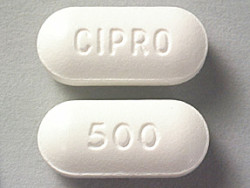Top Class Actions’s website and social media posts use affiliate links. If you make a purchase using such links, we may receive a commission, but it will not result in any additional charges to you. Please review our Affiliate Link Disclosure for more information.

The drug peaked in popularity and became a household name after the anthrax scare in the early 2000s as Cipro was one of the few drugs that was allegedly strong enough to combat the disease.
While it is now seen as a medication to be used after others have failed, when Cipro was a newer drug (and not many side effects had been reported), prescriptions were often indiscriminately handed out. It wasn’t until later that serious side effects were reported.
Cipro has been linked to serious side effects like tendon rupture (Achilles tendon, shoulder rotator cuff and more) and aortic aneurysm – both of which are thought to be results of the fluoroquinolone having deleterious effects on the collagen of the body.
Many others have reported fluoroquinolone toxicity from Cipro and related drugs and have developed systemic manifestations in the body, even after just one course of antibiotics. There is also investigation into Cipro causing mitochondrial toxicity.
Cipro has also been linked to Stevens Johnson Syndrome, a potentially fatal drug reaction. The link may be increased in those suffering hypothyroidism.
What is Stevens Johnson Syndrome?
Stevens Johnson Syndrome (or SJS) is an allergic reaction most commonly in response to a drug. Several classes of drugs have been linked to an increased risk of Stevens Johnson Syndrome, with fluoroquinolone antibiotics such as Cipro being one of them.
Stevens Johnson Syndrome symptoms usually start out as a flu-like syndrome, as patients initially present with malaise, sore throat, fever, chills and sore throat. Shortly after, the disease progresses and the characteristic Stevens Johnson rash appears. The rash consists of red or purple blisters affecting the mucous membranes of the body as well as the skin.
As the Stevens Johnson rash spreads, it causes the skin cells to die, and the skin begins to slough off of the body in large sheets. This leaves the individual looking like he or she has suffered serious burns. If the rash spreads to more than 30 percent of a patient’s body, the condition is referred to as Toxic Epidermal Necrolysis (TEN), and the prognosis of the disease is less favorable than SJS.
SJS is a medical emergency, and patients must be hospitalized to treat the disorder. Often, SJS victims are treated in the intensive care or burn units of hospitals, if available.
There is no cure for Stevens Johnson Syndrome. Patients must stop the drug that was believed to have caused the allergic reaction and the patient is stabilized with supportive care.
Patients with SJS may make a full recovery in a few weeks or months with little to no lasting effects. Others may take longer and may have permanent organ damage or suffer from blindness. With SJS, approximately 5-10% and with TEN, the mortality rate is much higher at 30-40%.
Odds of SJS May Be Increased for Hypothyroid Patients
A study published in Dermatology Online Journal found that patients who are hypothyroid who are being treated with levothyroxine (brand names Synthroid, Levoxyl, Levothroid, Unithroid and Tirosint) and who are taking Cipro may have an increased risk of suffering from Stevens Johnson Syndrome. Levothyroxine is the most commonly prescribed medication for patients who are hypothyroid.
The theorized mechanism of the increased likelihood of developing SJS while taking levothyroxine is postulated to be due to the excess dosage of levothyroxine reducing cytochrome activity in the body. Cytochrome activity is required to metabolize Cipro, so if its activity was reduced, it may have prompted the allergic drug reaction.
Patients are also told to take double doses of levothyroxine if they skipped a dose. This may increase a person’s risk of developing SJS while taking Cipro. Also, patient needs for levothyroxine fluctuate, and it is possible t have too much of the medication if frequent monitoring is not undertaken.
Filing a Cipro Stevens Johnson Syndrome Lawsuit
If you have taken Cipro and later developed Stevens Johnson Syndrome or Toxic Epidermal Necrolysis (with or without taking levothyroxine or having reduced thyroid activity) you may be entitled to legal compensation. An experienced attorney can provide you a free case review so you can understand your legal options before deciding how to proceed.
Do YOU have a legal claim? Fill out the form on this page now for a free, immediate, and confidential case evaluation. The Stevens Johnson Syndrome attorneys who work with Top Class Actions will contact you if you qualify to let you know if an individual lawsuit or class action lawsuit is best for you. [In general, SJS lawsuits are filed individually by each plaintiff and are not class actions.] Hurry — statutes of limitations may apply.
ATTORNEY ADVERTISING
Top Class Actions is a Proud Member of the American Bar Association
LEGAL INFORMATION IS NOT LEGAL ADVICE
Top Class Actions Legal Statement
©2008 – 2024 Top Class Actions® LLC
Various Trademarks held by their respective owners
This website is not intended for viewing or usage by European Union citizens.
Get Help – It’s Free
Help for Victims of Stevens Johnson Syndrome
If you or a loved one were diagnosed with Stevens Johnson Syndrome (SJS) or toxic epidermal necrolysis (TEN) after taking a prescribed or over-the-counter medication, you may be eligible to take legal action against the drug’s manufacturer. Filing an SJS lawsuit or class action lawsuit may help you obtain compensation for medical bills, pain and suffering, and other damages. Obtain a free and confidential review of your case by filling out the form below.
An attorney will contact you if you qualify to discuss the details of your potential case at no charge to you.
Oops! We could not locate your form.












